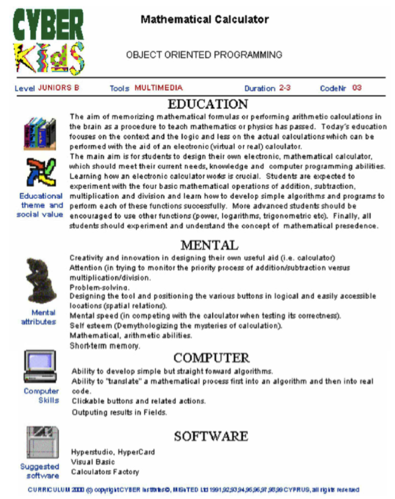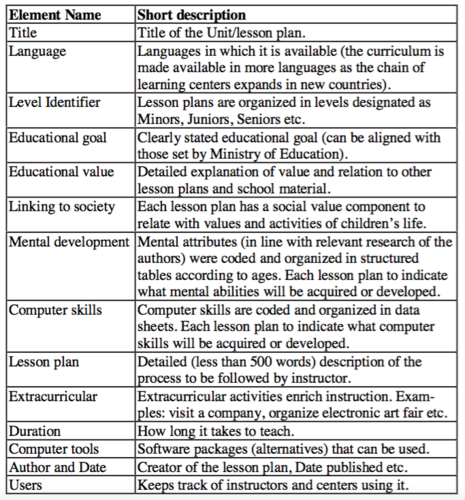KnowledgePacket Method: Difference between revisions
From Future Worlds Center Wiki
Jump to navigationJump to search
No edit summary |
No edit summary |
||
| Line 1: | Line 1: | ||
The '''KnowledgePacket® Method''' is an innovative method developed by the [[Cyprus Neuroscience and Technology Institute]] in the early 90s on behalf of [[CYBER KIDS]]. It | The '''KnowledgePacket® Method''' is an innovative method developed by the [[Cyprus Neuroscience and Technology Institute]] in the early 90s on behalf of [[CYBER KIDS]]. It was used as the ''formula'' for the development of every lesson plan<ref> Laouris, Y., & Eteokleous, N. (2005). Experiences from the application of knowledge packets as means for educationally, mentally, and socially balanced instruction. Recent Research Developments in Learning Technologies. 485-489. On line: http://www.formatex.org/micte2005/195.pdf.</ref>, <ref> Laouris, Yiannis (2014). Teams construct knowledge during project-driven social interactions. Educating in Dialog: Constructing meaning and building knowledge with dialogic technology, 24, 111. | ||
</ref> | |||
| Line 17: | Line 18: | ||
# Owner of the KnowledgePacket | # Owner of the KnowledgePacket | ||
===References=== | |||
{{Reflist|3}} | |||
[[Category:Educational Methods]] | [[Category:Educational Methods]] | ||
Latest revision as of 03:37, 16 August 2018
The KnowledgePacket® Method is an innovative method developed by the Cyprus Neuroscience and Technology Institute in the early 90s on behalf of CYBER KIDS. It was used as the formula for the development of every lesson plan[1], [2]
A KnowledgePacket® is composed of:
- The actual know-how and data to transmit to receiver/learner
- The Method of Delivery/Transmission and/or Lesson Plan
- The Tools to use in the process
- The Mental Development that will take place during the learning process
- Real-life applications of the specific knowledge
- Social value and importance of the specific knowledge"
- Author of the KnowledgePacket
- Owner of the KnowledgePacket
References
- ↑ Laouris, Y., & Eteokleous, N. (2005). Experiences from the application of knowledge packets as means for educationally, mentally, and socially balanced instruction. Recent Research Developments in Learning Technologies. 485-489. On line: http://www.formatex.org/micte2005/195.pdf.
- ↑ Laouris, Yiannis (2014). Teams construct knowledge during project-driven social interactions. Educating in Dialog: Constructing meaning and building knowledge with dialogic technology, 24, 111.

